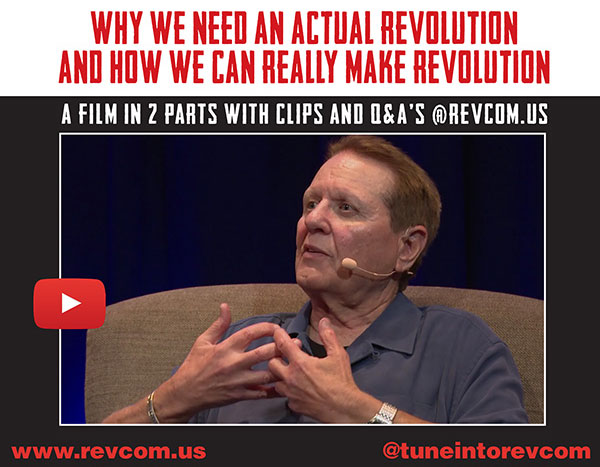Viewing Notes on Planet of the Humans...
To Change The Way We Live,
We Must Change The System We Live Under
by Raymond Lotta
| revcom.us
I recently watched Planet of the Humans, the new film produced by Michael Moore and directed by Jeff Gibbs. I’ve also followed the controversy surrounding the film. Is Planet of the Humans a useful tool that provides insights and indicates pathways of resistance for those concerned about the fate of the planet? The answer is that while it raises important questions and has some useful exposure of the limits and problems of “green energy” (like solar and wind power) under the current conditions of capitalism, the film is very much locked within the limits of the capitalist-imperialist system, the nature of which it does not grasp.
A Film That Ultimately Blames the People Not the System
For those not familiar with the film, it aims to unpack some of the popular illusions about “green” “renewable” energy: energy sources that do not deplete when used (like power from the sun) and that do not emit carbon dioxide that causes global warming.
The debate that the film wants to open up in part is over the claims made by “green energy” proponents for its limited ecological footprint. The film correctly points to how solar and wind power depend, in their current manufacture, on energy from fossil fuels and on raw materials requiring fossil fuels in the chain of production. There’s truth to this, and it is a real problem that cannot be seriously addressed within this system that is so highly reliant on profitable fossil fuels.
But when it comes to an actual analysis of the ecological emergency we are facing, and what underlies it, Planet of the Humans pins the blame of global warming and accelerating environmental devastation principally on people: on overconsumption—we, that’s us in the West, who can’t manage our appetites; and on overpopulation—that’s clearly the “they” of the “global south” who can’t manage procreation. As the film opens and surveys the vast ecological damage done to the planet, a somber voice-over offers this framing theme: “How much time do humans have? How would they know when it is our time to go?”
The film is awash in a kind of apocalyptic despair, of a species ravaging the planet through advanced technology. It puts before the camera several speakers identifying the problem as “industrial civilization” and overpopulation. The overall thrust and effect of Planet of the Humans is to let the economic-political system of capitalism-imperialism off the hook.
Now Moore and Gibbs have crammed their film with exposure of corporate interests driving certain green-energy projects—and it gives examples that should raise eyebrows of concern, especially among committed activists in this movement. The film also speaks to corporate influence over the environmental movement, especially through financial involvement and donations.1 This has seduced some viewers into seeing the film as a critique of capitalism. But the veil has not been lifted.
The essence or fundamental problem of capitalism is not, as Moore and Gibbs argue, “greedy” and “scheming” corporations. As can be seen here, capitalism is an economic system with certain fundamental features and inner drives. A system of private ownership of the means of production (factories, transport, means of communication, etc.)... a system organized around the production of profit based on the exploitation of wage labor worldwide... a system in which huge units and blocs of capital (corporations, banks, investment groups, etc.) are driven by competition to expand on the basis of cheapening production to gain market share and competitive advantage—or face ruin. It is a global system of exploitation and domination divided into rival capitalist-imperialist states (the U.S., Russia, China, Germany, France, etc.) safeguarding the national capital interests and contending with each other in pursuit of control over markets, raw materials, and regions in different parts of the world and domination over the oppressed countries of the world.
Planet of the Humans makes the point that that since renewables are not as productive at this stage as fossil fuels (true), and given the role of fossil fuel in the manufacture of solar and wind projects, renewables are no real improvement over fossil fuels. That conclusion is wrong, But the reality is that there is no easy transition away from fossil fuels, given how structured the economy is around them. And in a radically different economy and society, we would face the complex challenge of making a transition to renewables while having to meet the food, health, and housing needs of billions on the planet. Michael Moore and Jeff Gibbs assume, however, that green energy can only be developed in the problematic ways of today and serve corporate power and profit. The reason is that they are locked within the ideological horizons of the capitalist-imperialist system.
A Response of “Magical Thinking” About the System
The response by many within the mainstream environmental movement to the film’s world-weary cynicism and factual misrepresentations of renewable energy potential2 is to offer up a form of “magical thinking.” And this too lets the capitalist-imperialist system off the hook. The idea is propagated that the environmental movement has been making enormous strides, that we are on the cusp of a breakthrough to solve the problem of fossil-fuel addiction. It is the consoling fiction that green technology innovations and commercial viability, combined with a “Green New Deal” from on high, can readily transition us to a solar and wind-power future. All that’s missing, as the story line goes, are the funds, the political pressure from below, and political will to change.
This is as fanciful as it is dangerous. The capitalist-imperialist system has put humanity and the planet on a disastrous trajectory. For all the investments in renewable energy over the last 25 years, 80 percent of global energy derives from oil, coal, and natural gas. I have written about why this is the case—what this says about the functioning and foundations of the capitalist-imperialist system as it has historically evolved and the role of oil as a strategic commodity bound up with empire (see “50 Years Since Earth Day 1: Reflections on the Catastrophe That Is Capitalism-Imperialism” at revcom.us).
This is the reality, and the so-called Green New Deal is not a way out. I have written extensively on this, and encourage people to look at “5 Reasons ‘The Green New Deal’ Is Misleading, Dangerous and Part of the Problem—Delusion and Deception in Service of American Empire” at revcom.us.
And the current political situation could not be more dangerous. We are ruled over by the fascist Trump/Pence regime. It denies the reality of global warming... bullies scientists... and is ramping up fossil fuel production to ever-more calamitous levels (continuing in Obama’s footsteps/ecological footprint and expanding oil and fracking of natural gas).
An Inconvenient and Liberating Truth
There is an inconvenient but liberating truth that anyone who deeply cares about the future of humanity and the survival of the planet must confront and act on. To change the way we live, to change how an economy operates—this capitalist-imperialist economy that exploits and plunders worldwide—we must change the system we live under. For us to have any serious chance to protect the planet, we must make a revolution to overthrow this system.
There is a strategy to make that revolution; there is a plan and blueprint to build a radically new and far better society that can sustainably interact with nature—to fit humanity to become the caretakers of the planet. This is what the leadership of and the new communism developed by Bob Avakian (BA) make possible. And it takes concrete expression in the Constitution for the New Socialist Republic in North America authored by BA and in the associated Some Key Principles of Socialist Sustainable Development.
This is a revolution to overcome all exploitation and oppression and social divisions. To achieve a true world of community. It is our only chance to stop the destruction of the planet.
1. The film contains unprincipled attacks on Bill McKibben, the environmental writer and activist. It attributes positions to him that he no longer holds—rather than taking on his strongest arguments and current positions; and it falsely alleges that he is financially beholden to corporate interests. McKibben has a lot of illusions about the ability of the system to change from within, and has promoted programs and policies that do not lead to solving the environmental emergency. But this charge of being “bought” is not true and not productive of the kind of debate that needs to take place. [back]
2. Some critics of the film, including environmentalist and filmmaker Josh Fox, climate scientist Michael Mann, and others in a signed letter, have demanded that the film be removed from public viewing. The film has inaccuracies and the already mentioned attack on McKibben. Those behind the film should be called to task accordingly. But the film needs to be viewed and debated. [back]
See also:
“50 Years Since Earth Day 1: Reflections on the Catastrophe That Is Capitalism-Imperialism”
CONSTITUTION For The New Socialist Republic In North America
(Draft Proposal)
Authored by Bob Avakian, and adopted by the Central Committee of the RCP
How Would a Revolutionary Socialist Society Address the Environmental Emergency?
Excerpts from the Constitution for the New Socialist Republic in North America
See also:
Get a free email subscription to revcom.us:




